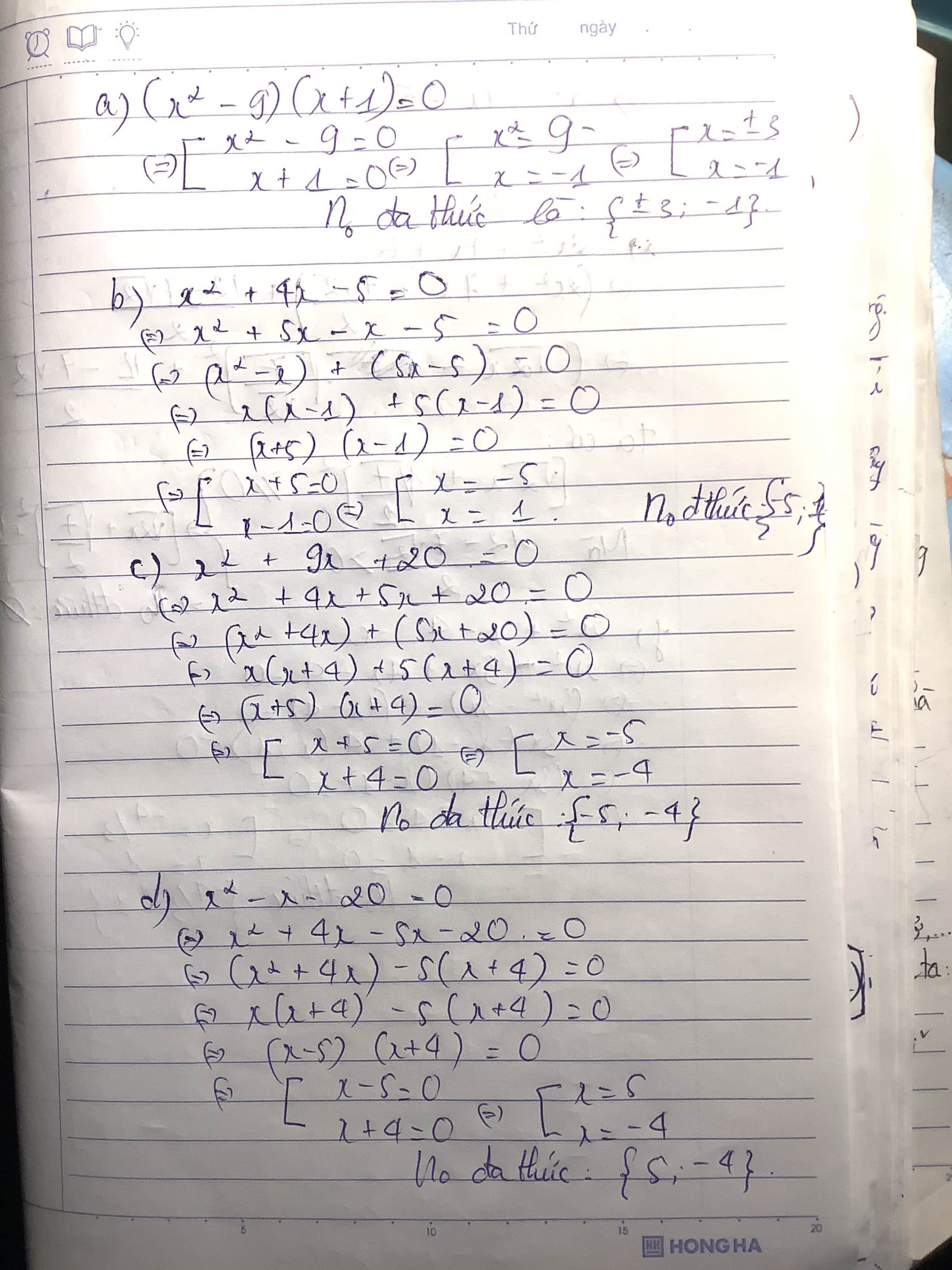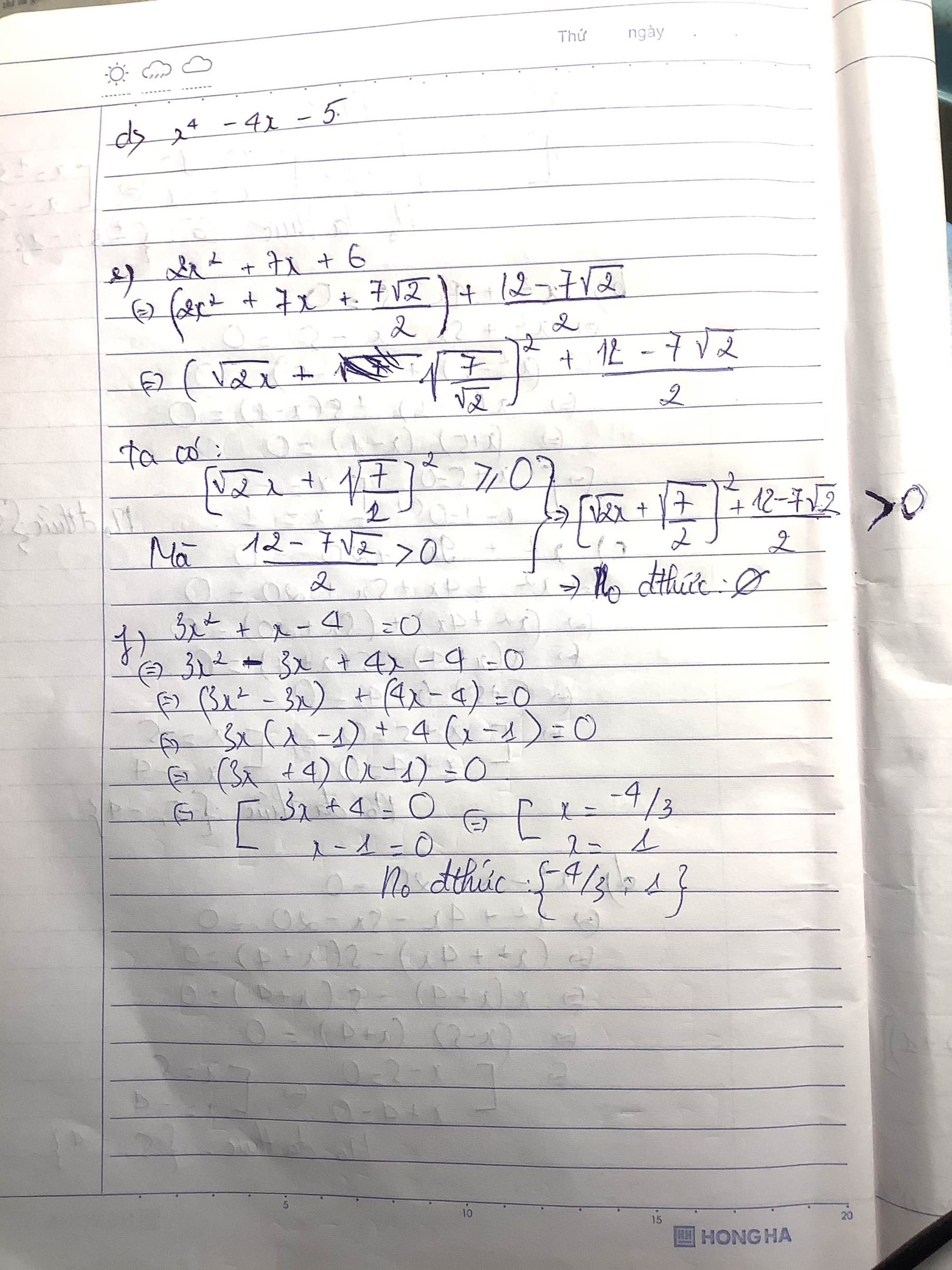Tìm nghiệm của đa thức f(x) = x2 - 7x + 6
Hãy nhập câu hỏi của bạn vào đây, nếu là tài khoản VIP, bạn sẽ được ưu tiên trả lời.


Chọn B
Vì f(1) = 0, f(6) = 0 nên nghiệm của đa thức là 1 và 6.

Phân tích đa thức thành nhân tử thôi bạn :
Ta có :
\(h\left(x\right)=x^2+5x+6\)
\(h\left(x\right)=x\left(x+2\right)+3\left(x+2\right)\)
\(h\left(x\right)=\left(x+2\right)\left(x+3\right)\)
\(\Rightarrow N_oh\left(x\right)=-2;-3\)
\(g\left(x\right)=2x^2+7x-9\)
\(g\left(x\right)=2x^2+9x-2x-9\)
\(g\left(x\right)=2x\left(x-1\right)+9\left(x-1\right)\)
\(g\left(x\right)=\left(x-1\right)\left(2x+9\right)\)
\(\Rightarrow N_og\left(x\right)=1;-4,5\)

Cho `f(x)=0`
`=>(x^2-2)(3x^4+6)=0`
Mà `3x^4+6 > 0 AA x`
`=>x^2=2`
`=>x^2=2`
`=>x=+-\sqrt{2}`
Vậy nghiệm của đa thức `f(x)` là `x=\sqrt{2}` hoặc `x=-\sqrt{2}`

a: f(x)=3x^4+2x^3+6x^2-x+2
g(x)=-3x^4-2x^3-5x^2+x-6
b: H(x)=f(x)+g(x)
=3x^4+2x^3+6x^2-x+2-3x^4-2x^3-5x^2+x-6
=x^2-4
f(x)-g(x)
=3x^4+2x^3+6x^2-x+2+3x^4+2x^3+5x^2-x+6
=6x^4+4x^3+11x^2-2x+8
c: H(x)=0
=>x^2-4=0
=>x=2 hoặc x=-2

a) \(f\left(x\right)=x^2+7x-8=0\)
\(\Leftrightarrow f\left(x\right)=x^2-x+8x-8=0\)
\(\Leftrightarrow f\left(x\right)=\left(x^2-x\right)+\left(8x-8\right)=0\)
\(\Leftrightarrow f\left(x\right)=x\left(x-1\right)+8\left(x-1\right)=0\)
\(\Leftrightarrow f\left(x\right)=\left(x-1\right)\left(x+8\right)=0\)
\(\Rightarrow x-1=0\) hoặc \(x+8=0\)
Nếu \(x-1=0\Rightarrow x=1\)
Nếu \(x+8=0\Rightarrow x=-8\)
Vậy đa thức f(x) có nghiệm là 1 và -8
b) \(k\left(x\right)=5x^2+9x+4=0\)
\(\Leftrightarrow k\left(x\right)=5x^2+5x+4x+4=0\)
\(\Leftrightarrow k\left(x\right)=\left(5x^2+5x\right)+\left(4x+4\right)=0\)
\(\Leftrightarrow k\left(x\right)=5x\left(x+1\right)+4\left(x+1\right)=0\)
\(\Leftrightarrow k\left(x\right)=\left(x+1\right)\left(5x+4\right)=0\)
\(\Rightarrow x+1=0\) hoặc \(5x+4=0\)
Nếu \(x+1=0\Rightarrow x=-1\)
Nếu \(5x+4=0\Rightarrow x=-\frac{4}{5}\)
Vậy đa thức k(x) có nghiệm là -1 và -4/5

1. F(-1) = 2.(-1)2 – 3. (-1) – 2 = 2.1 + 3 – 2 = 3
F(0) = 2. 02 – 3 . 0 – 2 = -2
F(1) = 2.12 – 3.1 – 2 = 2 – 3 – 2 = -3
F(2) = 2.22 – 3.2 – 2 = 8 – 6 – 2 = 0
Vì F(2) = 0 nên 0 là 1 nghiệm của đa thức F(x)
2. Vì đa thức E(x) có hệ số tự do bằng 0 nên có một nghiệm là x = 0.

1:
a: f(3)=2*3^2-3*3=18-9=9
b: f(x)=0
=>2x^2-3x=0
=>x=0 hoặc x=3/2
c: f(x)+g(x)
=2x^2-3x+4x^3-7x+6
=6x^3-10x+6


\(f\left(x\right)=x2-7x+6\)
ta có f(x)=0
hay\(x2-7x+6=0\)
\(\Leftrightarrow x2-7x=-6\)
\(\Leftrightarrow x\left(-5\right)=-6\)
\(\Leftrightarrow x=\frac{6}{5}\)
vậy nghiệm của đa thức f(x) là 6/5
\(f\left(x\right)=x^2-7x+6\)
\(f\left(x\right)=0\Leftrightarrow x^2-7x+6=0\)
\(\Leftrightarrow x^2-x-6x+6=0\)
\(\Leftrightarrow x.\left(x-1\right)-6.\left(x-1\right)=0\)
\(\Leftrightarrow\left(x-1\right).\left(x-6\right)=0\)
\(\Leftrightarrow\orbr{\begin{cases}x-1=0\\x-6=0\end{cases}\Leftrightarrow}\orbr{\begin{cases}z=1\\x=6\end{cases}}\)
Vậy phương trình có 2 nghiệm \(x=\left\{1,6\right\}\)